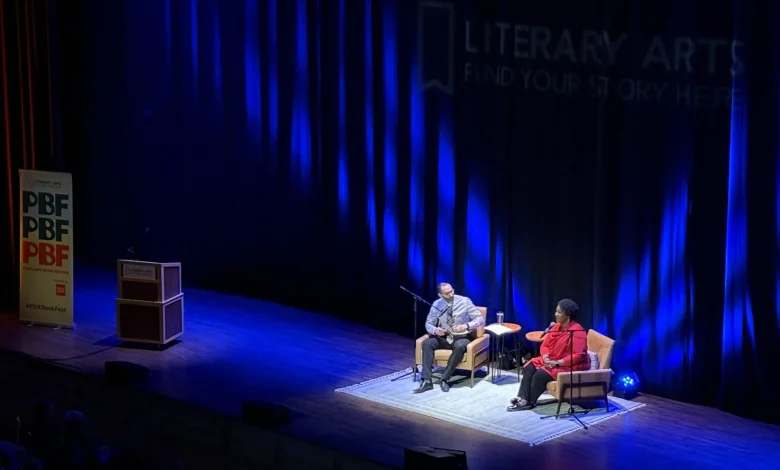Portland Book Festival: Stacey Abrams, Susan Orlean on the perils, pitfalls, and joys of writing

OPB’s Dave Miller interviewed Stacey Abrams about her new thriller, “Coded Justice,” in the Arlene Schnitzer Concert Hall during the Portland Book Festival on Saturday. Photo by: Amanda Waldroupe
Writing — whether fiction, nonfiction, short pieces, novels, or memoirs — is a creative act, an act of resistance, a way to educate readers and inspire action, and to form a better understanding of one’s self and past experiences.
That does not mean writing is without its challenges and near defeats, and many writers who appeared at this year’s sold-out Portland Book Festival shared how they faced them.
During a conversation with Andrew Proctor, Literary Arts’ executive director, Susan Orlean said that her decades-long career at The New Yorker, and as an author of numerous books, including her recently released memoir Joyride, were the result of a combination of luck, purposefulness, hard work, and perseverance.
“You have to be ready to be lucky. You need to put yourself in a position where luck can find you,” Orlean said.
Reflecting on balancing “working hard and being purposeful,” Orlean continued, “I knew what I wanted, and I was very deliberate about thinking, ‘What’s the next step to get me to what I want?’”
Challenges were faced and overcome, as Orlean wrote in Joyride. Those include two canceled book contracts and profile subjects who “refused to speak to me or the story kind of fell apart,” Orlean said in response to a question from Proctor. “Twice, I flew long distances, only to have everyone I thought I was going to be interviewing just sort of vanish on me.”
Her editor advised, “Give it one more beat. Just wait, just see.” In that space of time, Orlean said, she could see how to reshape a story and make it work.
Sponsor
“The falling apart part is a part of growth … what felt like disaster was just a part of the process” of the story reshaping itself. She learned to look at such instances “not as defeat, but this is transforming.”
She compared such situations to travel plans suddenly going awry. “That’s when you really begin to see [the story] for what it is,” Orlean said, and experience a “thrill of discovery.”
In an interview with Literary Arts’ Andrew Proctor, Susan Orlean said of her career, “I knew what I wanted, and I was very deliberate about thinking, ‘What’s the next step to get me to what I want?’” Photo by : Amanda Waldroupe
Stacey Abrams, a political activist and Democratic nominee for Georgia governor in 2018 (which made her the first Black woman to secure a major party’s nomination for a gubernatorial seat), spoke to an audience that filled the orchestra and dress circle sections of the Arlene Schnitzer Concert Hall.
She is also the author of 17 books, including thrillers, romance novels, children’s books, and political memoir. Much of her conversation with OPB’s Dave Miller focused on her recently released Coded Justice, the third installment of the Avery Keene series about the dangers and promise of AI.
When she first began publishing in the early 1990s, Abrams published under the pseudonym “Selena Montgomery.” She also worked as a tax attorney and published articles on tax law.
“Anything I wrote as a tax person would sit cheek by jowl with romance,” she said. “In the late ‘90s, we were not the most permissive society for things to be true.”
Now publishing under her own name, her fiction books do not shy from engaging in political issues and discourse. For her newest book, Abrams deeply researched artificial intelligence, including interviewing people working in that sector.
Sponsor
The questions posed by the novel’s central character, former Supreme Court clerk and investigator Avery Keene, as well as the team of people Keene has around her, Abrams said, are intended to inform and educate her readers.
“It’s arming the people with the questions they should be asking and giving them the information to use when they hear what’s coming out of the public domain,” Abrams said.
(From left) Lidia Yuknavitch, Melissa Febos, and moderator Marisa Siegel talked about truth and memory in a session in The Old Church. Photo by: Amanda Waldroupe
Speaking in The Old Church, memoirist and essayist Melissa Febos, author of the recently released The Dry Season, and author Lidia Yuknavitch, author of the memoir Reading the Waves, tackled topics often taken on by writers of memoirs and personal narrative, including concepts of truth, memory, and excavating and integrating the past.
“The truth I’m most looking for when I write … is what could I not bear to see when it happened that I can now bear to see, that will help me integrate that experience,” Febos said.
Reflecting on the creative process, she recalled a quote by the Renaissance sculptor Michelangelo: “I saw the angel in the marble, and carved until I set him free.”
Both Febos and Yuknavitch have written about difficult experiences from their lives, including struggling with and overcoming addiction, toxic relationships, and their childhoods. Each time, Febos said, she often conducts independent research –– in the case of The Dry Season, a memoir about celibacy, researching other women throughout history who chose celibacy –– “because I want to avoid my feelings.”
“That’s why we’re writers,” Yuknavitch responded, to raucous laughter from the audience.
Sponsor
“Being a writer is the most genius, resilient, psychic move,” Febos responded, “because we get to run away from our feelings into a labyrinth that will inevitably return us to ourselves.”





